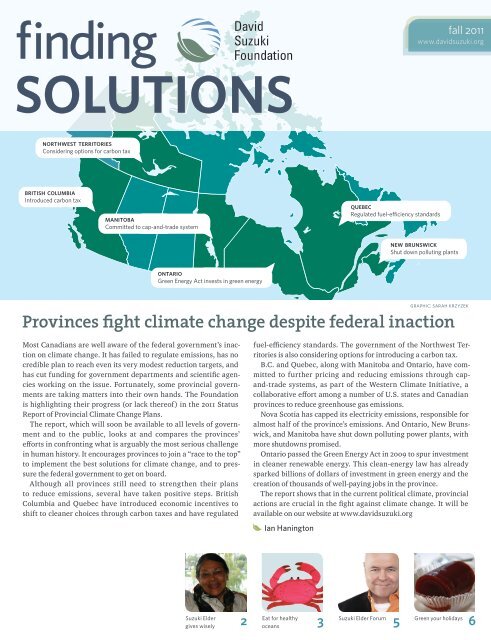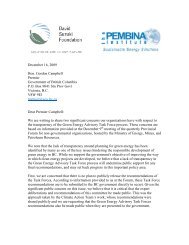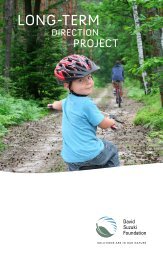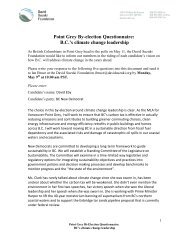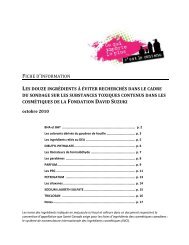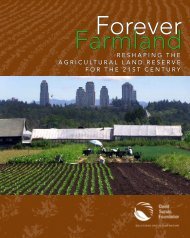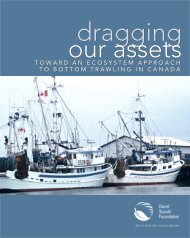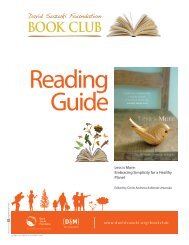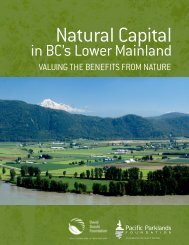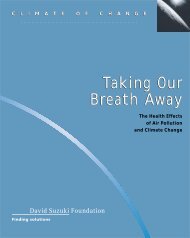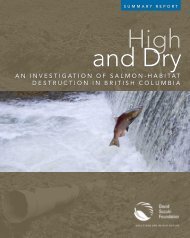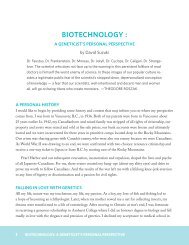Finding Solutions — Fall 2011 (PDF) - David Suzuki Foundation
Finding Solutions — Fall 2011 (PDF) - David Suzuki Foundation
Finding Solutions — Fall 2011 (PDF) - David Suzuki Foundation
You also want an ePaper? Increase the reach of your titles
YUMPU automatically turns print PDFs into web optimized ePapers that Google loves.
finding<br />
SOLUTIONS<br />
fall <strong>2011</strong><br />
www.davidsuzuki.org<br />
NORTHWEST TERRITORIES<br />
Considering options for carbon tax<br />
BRITISH COLUMBIA<br />
Introduced carbon tax<br />
MANITOBA<br />
Committed to cap-and-trade system<br />
QUEBEC<br />
Regulated fuel-efficiency standards<br />
NEW BRUNSWICK<br />
Shut down polluting plants<br />
ONTARIO<br />
Green Energy Act invests in green energy<br />
graphic: Sarah Krzyzek<br />
Provinces fight climate change despite federal inaction<br />
Most Canadians are well aware of the federal government’s inaction<br />
on climate change. It has failed to regulate emissions, has no<br />
credible plan to reach even its very modest reduction targets, and<br />
has cut funding for government departments and scientific agencies<br />
working on the issue. Fortunately, some provincial governments<br />
are taking matters into their own hands. The <strong>Foundation</strong><br />
is highlighting their progress (or lack thereof) in the <strong>2011</strong> Status<br />
Report of Provincial Climate Change Plans.<br />
The report, which will soon be available to all levels of government<br />
and to the public, looks at and compares the provinces’<br />
efforts in confronting what is arguably the most serious challenge<br />
in human history. It encourages provinces to join a “race to the top”<br />
to implement the best solutions for climate change, and to pressure<br />
the federal government to get on board.<br />
Although all provinces still need to strengthen their plans<br />
to reduce emissions, several have taken positive steps. British<br />
Columbia and Quebec have introduced economic incentives to<br />
shift to cleaner choices through carbon taxes and have regulated<br />
fuel-efficiency standards. The government of the Northwest Territories<br />
is also considering options for introducing a carbon tax.<br />
B.C. and Quebec, along with Manitoba and Ontario, have committed<br />
to further pricing and reducing emissions through capand-trade<br />
systems, as part of the Western Climate Initiative, a<br />
collaborative effort among a number of U.S. states and Canadian<br />
provinces to reduce greenhouse gas emissions.<br />
Nova Scotia has capped its electricity emissions, responsible for<br />
almost half of the province’s emissions. And Ontario, New Brunswick,<br />
and Manitoba have shut down polluting power plants, with<br />
more shutdowns promised.<br />
Ontario passed the Green Energy Act in 2009 to spur investment<br />
in cleaner renewable energy. This clean-energy law has already<br />
sparked billions of dollars of investment in green energy and the<br />
creation of thousands of well-paying jobs in the province.<br />
The report shows that in the current political climate, provincial<br />
actions are crucial in the fight against climate change. It will be<br />
available on our website at www.davidsuzuki.org<br />
Ian Hanington<br />
<strong>Suzuki</strong> Elder<br />
gives wisely<br />
Eat for healthy<br />
<strong>Suzuki</strong> Elder Forum<br />
Green your holidays<br />
2 3 5 6<br />
oceans
donor profile<br />
<strong>Suzuki</strong> Elder finds a new way to give<br />
I retired, I would come back. I retired in<br />
2006, and have since been working with<br />
the Development department.<br />
What has your time as a<br />
<strong>Suzuki</strong> Elder taught you?<br />
I’ve realized that there is so much to learn<br />
from other people, and so much can be<br />
accomplished when everyone shares their<br />
thoughts on a subject, for things can be<br />
done in so many different ways. The elders<br />
have accumulated much experience over<br />
the years, and we are working to make a<br />
bridge between elders and young people,<br />
so we can benefit and learn from each other.<br />
Archana Datta (second from left)<br />
with <strong>David</strong> <strong>Suzuki</strong>, Penny Wilson,<br />
and Tara Cullis. Photo: Lenny Ford<br />
“Now this is my way<br />
of giving gifts. It’s an<br />
elder’s way of giving.”<br />
Archana Datta is a familiar face at the<br />
<strong>Foundation</strong>’s Vancouver office. A longtime<br />
volunteer and member of the <strong>Suzuki</strong><br />
Elders, Archana recently made a special<br />
donation to the <strong>Foundation</strong> in lieu of an<br />
anniversary gift to friends.<br />
How did you originally get<br />
involved with the <strong>Foundation</strong>?<br />
I am from a Third World country where we<br />
hardly used to waste anything. There were<br />
no chemical fertilizers in India<strong>—</strong>it was all<br />
organic. So when I first came to Canada,<br />
the concept of pollution was not clear to<br />
me. In 1982, I got in touch with the <strong>Suzuki</strong><br />
family, and I saw how hard [<strong>David</strong> <strong>Suzuki</strong>’s<br />
father] Carr <strong>Suzuki</strong> was working to utilize<br />
natural things, like seaweed as fertilizer. It<br />
made me aware of how all humans contribute<br />
to the Earth, good and bad.<br />
When I first volunteered with the <strong>Foundation</strong><br />
in the ’90s, I told <strong>David</strong> that when<br />
See page 5 for information about the<br />
<strong>Suzuki</strong> Elders’ upcoming forum, which aims<br />
to empower elders to make positive environmental<br />
change.<br />
You recently made a donation to<br />
the <strong>Foundation</strong> in honour of your<br />
friends’ 25th wedding anniversary.<br />
What made you decide to do this?<br />
I’ve been asking myself this lately<strong>—</strong>why<br />
do we gift in terms of “things”? It’s a social<br />
norm. But nowadays when a child is born,<br />
instead of a normal “gift,” I give whatever<br />
money I can to the child’s parents and<br />
tell them to open an education account. I<br />
wanted to do something similar for adult<br />
gifts, so I asked my friend who was celebrating<br />
her anniversary for suggestions.<br />
She immediately replied, “You volunteer for<br />
the <strong>David</strong> <strong>Suzuki</strong> <strong>Foundation</strong><strong>—</strong>donate to<br />
them in our name.”<br />
It opened my eyes<strong>—</strong>now this is my way<br />
of giving gifts. It’s an elder’s way of giving.<br />
Leave a legacy for the children of tomorrow<br />
Build the <strong>David</strong> <strong>Suzuki</strong> <strong>Foundation</strong> into your estate planning. Consider a gift in<br />
your will, or another type of legacy gift, to help ensure a healthy environment for<br />
generations to come. Or, if you’ve already done so, let us know so we can thank you!<br />
Please contact Katie Loftus at<br />
604.732.4228 • 1.800.453.1533 • kloftus@davidsuzuki.org<br />
2
Eat for healthy oceans<br />
…with help of new SeaChoice<br />
wallet card phone app<br />
Choosing sustainable seafood just got easier, with the updated<br />
SeaChoice Ocean-Friendly Seafood wallet card. The card’s new<br />
layout allows seafood lovers to check their options while grocery<br />
shopping and dining out. Seafood appears in three categories<strong>—</strong><br />
Best Choice, Some Concerns, and Avoid<strong>—</strong>depending on harvesting<br />
method and location.<br />
The card features updated rankings and new species as well<br />
as an alternatives chart that helps you quickly find a Best Choice<br />
substitute for one of the less desirable species. These changes have<br />
been incorporated into the free SeaChoice Ocean-Friendly Seafood<br />
iPhone app. The card and the app are available for download<br />
at www.SeaChoice.org.<br />
Safeway, too, says yes to<br />
ocean-friendly seafood<br />
This summer, Canada Safeway announced its commitment to<br />
ocean-friendly seafood. By 2015, all fresh and frozen seafood sold<br />
by the grocery chain will come from sustainable and traceable<br />
sources, or be in a credible improvement project.<br />
Safeway joins a growing list of SeaChoice business partners that<br />
includes the Overwaitea Food Group, Federated Co-operatives<br />
Ltd., Whole Foods, and Bento Nouveau. As a partner organization<br />
of SeaChoice, the <strong>Foundation</strong> will help educate Canada Safeway<br />
staff and consumers in over 200 stores about the environmental<br />
issues associated with seafood. Congratulations to Canada Safeway<br />
for making one big step toward healthy oceans!<br />
Jodi Garwood<br />
Ambassadors for oceanfriendly<br />
seafood<br />
A fleet of SeaChoice Ambassadors recently joined the <strong>Foundation</strong> to<br />
help promote sustainable seafood. The ambassadors are part of a sixmonth<br />
pilot campaign aimed at increasing awareness and purchasing<br />
of ocean-friendly seafood in B.C.’s Lower Mainland. They include media<br />
professionals, “foodies,” chefs, restauranteurs, fishers, and event organizers,<br />
and they are writing, cooking, and speaking for change.<br />
Armed with the new SeaChoice wallet cards and training from our<br />
Marine team, the ambassadors are working in their communities<br />
to inform people about where our seafood comes from, how it is harvested,<br />
and how we can all choose wisely when we shop and dine out.<br />
Learn more about the ambassadors at www.davidsuzuki.org/eatfor-healthy-oceans.<br />
If you’re interested in becoming an ocean-friendly<br />
seafood ambassador, contact Sophika Kostyniuk at skostyniuk@<br />
davidsuzuki.org.<br />
illustrations: sarah Krzyzek<br />
3
iefs<br />
Environment minister acts on<br />
<strong>Foundation</strong>’s advice<br />
Recently, we learned that Maxim Power Corp. was rushing to<br />
build a coal-fired plant in Alberta that would emit far more<br />
greenhouse gas than impending federal rules would allow. We<br />
asked our supporters to write to Federal Environment Minister<br />
Peter Kent and demand that Maxim stop the rush job. A few<br />
weeks later, Kent announced that he’d heard Canadians loud and<br />
clear, and he would not tolerate companies rushing to complete<br />
dirty power projects.<br />
Montreal office has a new green home<br />
The Montreal branch of the<br />
<strong>Foundation</strong> recently moved<br />
into a new office building<br />
that is quickly becoming<br />
the heart of the city’s environmental<br />
movement. La<br />
maison du développement<br />
durable (Centre for Sustainable Development) boasts geothermal<br />
heating, a living plant wall, and an underground cistern that<br />
diverts rainwater to the building’s low-flow toilets. Like-minded<br />
neighbours in the building include Équiterre and Amnistie Internationale<br />
Canada Francophone.<br />
Megaquarry campaign<br />
prompts assessment<br />
Led by <strong>Foundation</strong> scientist John Werring, we recently joined<br />
over 130,000 Canadians in opposing a proposed limestone<br />
megaquarry near Melancthon, Ontario, which would leave a<br />
hole in the ground twice the size of Niagara <strong>Fall</strong>s. Thanks to<br />
pressure from local residents, politicians, First Nations, and<br />
nonprofit organizations, the Ontario government decided that<br />
this project should, at very least, be subject to a formal provincial<br />
environmental assessment. As the project transcends<br />
provincial boundaries, we are encouraging the federal government<br />
to get involved in the process.<br />
Feds reject funding for Pacific<br />
North Coast planning<br />
In our last issue of <strong>Finding</strong> <strong>Solutions</strong>,<br />
we profiled an ocean management<br />
and marine protected areas planning<br />
process for Canada’s Pacific North<br />
Coast. We and many participants<br />
were deeply disappointed to learn<br />
in September that the federal government<br />
pulled out of the funding<br />
photo: Lloyd K. Barners<br />
arrangement aimed at bringing scientific<br />
advice and community input to the process. Learn more<br />
and take action at: www.davidsuzuki.org/marine-planning.<br />
Former <strong>Foundation</strong> board member Ray Anderson<br />
photo: interfacefloreu<br />
Honouring two visionaries<br />
Like many environmental advocates, we at the <strong>Foundation</strong><br />
were saddened by the passing of two great leaders in the past<br />
few months.<br />
Jack Layton, who passed away in late August, needs little<br />
introduction. The leader of the NDP for eight years, Layton<br />
worked tirelessly toward his vision of an equal, just, and<br />
healthy nation. He was also very concerned with environmental<br />
issues. To quote <strong>David</strong> <strong>Suzuki</strong>: “Jack never forgot that<br />
justice and human rights were deeply embedded in issues<br />
of the environment. Today, too many of us act as if these are<br />
somehow separate, and so we are either environmentalists or<br />
workers for social justice. To Jack, they were a part of the same<br />
struggle for sustainable societies.”<br />
Also in August, we lost Ray Anderson, former <strong>Foundation</strong><br />
board member and the chair and founder of Interface, Inc.<br />
After coming to the life-changing realization that his business<br />
practices were harming the Earth, Anderson established a new<br />
mission for his company: achieving sustainability<strong>—</strong>operating<br />
in a way that does nothing to harm the Earth<strong>—</strong>by 2020. “Mission<br />
Zero,” as he called it, was a lofty goal for any company, let<br />
alone a flooring company reliant on the petroleum industry,<br />
but two years ago, he announced in an interview that Interface<br />
was already halfway there.<br />
Anderson’s ideas and drive influenced countless people,<br />
environmentalists, and businesspeople. He gave over a thousand<br />
speeches, wrote two books, and inspired many businesses<br />
to follow his lead, including GE and Walmart.<br />
Despite the traditional priorities of business and politics,<br />
Anderson and Layton never lost sight of what was fundamentally<br />
important<strong>—</strong>the health and well-being of humans and<br />
the environment. Both were ambitious, compassionate, and<br />
inspiring, and both succumbed to brave battles with cancer.<br />
They will be very much missed.<br />
Are you a teacher or youth educator?<br />
Sign up to learn about our youth-related activities and how we’re<br />
working with young Canadians to solve environmental challenges.<br />
www.davidsuzuki.org/young-canadians<br />
4
Google Earth helps put<br />
dollar value on nature<br />
Google Earth mapping software will allow users to highlight a region on the map and learn about the natural capital benefits within it.<br />
Imagine being able to find your backyard or neighbourhood park<br />
on a digital map and instantly learn how much the natural features<br />
inside it are worth. Thanks to a new partnership between the <strong>Foundation</strong><br />
and Google Earth Outreach, you’ll soon be able to do just that.<br />
Google’s Earth Outreach program gives nonprofit organizations<br />
the resources they need to create visuals that strengthen their causes.<br />
In the past few years they’ve helped organizations make positive<br />
change in many ways, from mapping genocide in Darfur to bringing<br />
Google Street View to the Amazon rainforest.<br />
The <strong>Foundation</strong> will use Google Earth mapping tools to illustrate<br />
a concept that is at once crucial to protecting nature in Canada and<br />
difficult to envision. The idea of “natural capital” involves looking<br />
at nature’s benefits and services in monetary terms. It’s an effective<br />
way of reminding ourselves that fields, forests, and wetlands provide<br />
important services, like cleaning our air, filtering water, and providing<br />
food to sustain us. Putting a dollar value on local ecosystems can<br />
help decision-makers and the public better understand the importance<br />
of protecting nature.<br />
After years of research into the valuation of ecosystem services, the<br />
<strong>Foundation</strong> has a wealth of natural capital data that, with the help<br />
of these new mapping tools, will be made accessible to the public,<br />
enabling them to discover the value of their own local environments.<br />
The application will allow users to highlight a region on a map and<br />
learn about the types of nature within it, as well as the natural capital<br />
benefits and values (see image above). It will also allow users to add<br />
or remove natural items and human-made infrastructure, and discover,<br />
for example, how the natural capital valuation changes when<br />
they remove a wetland and replace it with a parking lot or a LEEDcertified<br />
building.<br />
This new application will not only strengthen our arguments for<br />
protecting nature in Canada, but will allow our supporters to make<br />
strong cases for their own initiatives as well. Currently in development,<br />
the application will initially focus on Southern Ontario. We<br />
hope to expand it to include other parts of Canada.<br />
<strong>Suzuki</strong> Elders Forum promises inspiration and empowerment<br />
On November 24, the Association of <strong>Suzuki</strong> Elders will host<br />
an exciting Elders and Environment Forum to encourage and<br />
empower others to address critical environmental concerns.<br />
A dedicated group of <strong>Foundation</strong> volunteers, the Elders use their<br />
knowledge and experience to mentor younger generations and<br />
other elders on environmental issues. After hosting a similar forum<br />
in 2009, they continued to hear the question “What can I do?” from<br />
elders concerned about the state of the Earth.<br />
In response, they made this year’s theme their answer to that<br />
question: “Start where you are.”<br />
Keynote speaker Terry O’Reilly, host of the hit CBC radio show<br />
The Age of Persuasion, will kick off the forum with the talk “Start<br />
with your message,” sharing his insights about communication<br />
strategies to engage families, friends, and communities in worthwhile<br />
discussions of climate change.<br />
Smaller discussion groups will follow, including “Start with what<br />
we eat,” facilitated by Herb Barbolet, cofounder of Farm Folk/City<br />
Folk, and “Start with where we live,”<br />
led by Amanda Pitre-Hayes of the City<br />
of Vancouver’s Sustainability Group.<br />
Lindsay Coulter, <strong>David</strong> <strong>Suzuki</strong>’s Queen<br />
of Green, will lead the discussion<br />
“Start with a story,” and activist Jackie<br />
Larkin will guide a deep ecology discussion<br />
called “Start with our selves.”<br />
<strong>David</strong> <strong>Suzuki</strong> will give the closing<br />
presentation: “Start where we are<strong>—</strong><br />
standing on elder ground.”<br />
Elders who cannot travel to Vancouver<br />
for the forum will be able to<br />
watch selected clips and talks online. See the <strong>Suzuki</strong> Elders’ website,<br />
https://sites.google.com/site/eldersdsf, for more information<br />
and to register.<br />
Rachelle Delaney<br />
CBC’s Terry O’Reilly will be the<br />
keynote speaker at the Elders<br />
and Environment Forum.<br />
5
funding solutions<br />
<strong>Foundation</strong> Development Officer Kathrin Majic<br />
(left) and volunteer Brianne Kelly show off their race<br />
T-shirts before the Toronto half-marathon.<br />
Supporters run, walk,<br />
and paddle to raise<br />
awareness and dollars<br />
People who love to be active in the great outdoors know<br />
they can’t do it without clean air to breathe and unpolluted<br />
water to stay hydrated. So they’re pairing fun times with<br />
fundraising to protect nature.<br />
This was the first year participants could make the <strong>David</strong><br />
<strong>Suzuki</strong> <strong>Foundation</strong> their charity of choice in the Scotiabank<br />
Toronto Waterfront Marathon, one of the most competitive<br />
races in North America. Fifty people signed up to raise<br />
money for the <strong>Foundation</strong> in the full and half marathons<br />
and 5K events, and raised over $12,000!<br />
Upcoming race opportunities to join the <strong>Foundation</strong> team<br />
include the Good Life Fitness Toronto Marathon on Sunday<br />
May 6, the Scotiabank Blue Nose Marathon in Halifax, May<br />
18-20, and the Scotiabank Half-Marathon & 5k in Vancouver<br />
June 24. All have options for a variety of fitness levels.<br />
Meanwhile, Bob Purdy of Kelowna has pledged to do his<br />
favourite outdoor activity, stand-up paddling, every day in<br />
<strong>2011</strong> to benefit the <strong>Foundation</strong><strong>—</strong>sun, rain, or snow. Check out<br />
Bob’s “answer to nature’s call” at www.paddlefortheplanet.ca.<br />
Whether it’s a large, organized event or something solo,<br />
dedicating your personal activity to support the <strong>Foundation</strong><br />
is a great way to get moving outside, achieve a personal goal,<br />
and support the Earth that supports us all. Contact Kathrin<br />
Majic at kmajic@davidsuzuki.org or 416-348-9885 for more<br />
information.<br />
Gail Mainster<br />
Tips for greening your holidays<br />
Make cranberry sauce<br />
Bisphenol-A (BPA), a hormone-disrupting chemical, is found in<br />
the epoxy resin that lines many canned goods. Recently, BPA<br />
was found to migrate out of canned foods like baby formula,<br />
beans, soup, and cranberry sauce. Reduce your exposure to<br />
BPA<strong>—</strong>switch to fresh, frozen, or dried goods and make your<br />
own cranberry sauce from fresh or frozen berries!<br />
Give the gift of time<br />
Shopping is becoming a national pastime. This holiday season,<br />
check your list twice. Do you own your stuff or does your stuff<br />
own you? According to Statistics Canada, 900,000 tonnes of<br />
garbage are produced between Thanksgiving and Christmas<br />
each year. Consume less; spend quality time with family and<br />
friends instead. If you’re going to buy, buy less and buy local.<br />
Skip the unsustainable shrimp ring at the holiday table this year.<br />
photo: JP Daigle<br />
Take a pass on ye olde shrimp ring!<br />
Cross that hosting standby, the shrimp ring appetizer, off your<br />
holiday menu. Farmed shrimp are one the most consumed<br />
aquaculture products per capita in Canada. Unfortunately,<br />
farmed shrimp has a large environmental impact. Choose better<br />
options, like tasty Dungeness crab cakes, with the help of<br />
Canada’s Seafood Guide at www.SeaChoice.org.<br />
Lindsay Coulter,<br />
<strong>David</strong> <strong>Suzuki</strong>’s Queen of Green<br />
6
ecommended<br />
finding SOLUTIONS<br />
A publication of the <strong>David</strong> <strong>Suzuki</strong><br />
<strong>Foundation</strong>, a registered Canadian<br />
charity working to protect the diversity<br />
of nature and our quality of life, now<br />
and for the future.<br />
2211 West 4th Ave., Suite 219<br />
Vancouver, B.C., Canada, V6K 4S2<br />
tel 604-732-4228<br />
toll free 1-800-453-1533<br />
fax 604-732-0752<br />
davidsuzuki.org<br />
Editor Rachelle Delaney<br />
Contributors<br />
Leanne Clare, Lindsay Coulter,<br />
Jodi Garwood, Panos Grames, Ian<br />
Hanington, Sarah Krzyzek, Gail<br />
Mainster, <strong>David</strong> <strong>Suzuki</strong><br />
Design and Production<br />
Johannes Schut<br />
Board of Directors<br />
Stephen Bronfman, Dr. Tara Cullis<br />
(President and Co-Founder), Sarika<br />
Cullis-<strong>Suzuki</strong>, Severn Cullis-<strong>Suzuki</strong>,<br />
Pauline D’Amboise (Secretary), James<br />
Hoggan (Chair), <strong>David</strong> Miller, Dr.<br />
Samantha Nutt, Miles Richardson,<br />
George Stroumboulopoulos, Dr. Peter<br />
Victor, Elaine Wong (Treasurer)<br />
Co-Founder<br />
Dr. <strong>David</strong> <strong>Suzuki</strong><br />
Chief Executive Officer<br />
Peter Robinson<br />
Development Director<br />
Andrea Seale<br />
Public Affairs and Communications<br />
Director<br />
James Boothroyd<br />
Director of Finance and Technology<br />
Vic Johnston<br />
Program Directors<br />
Morag Carter, Karel Mayrand,<br />
Dr. Faisal Moola, Jay Ritchlin<br />
Human Resources Director<br />
Marie-Claire Seebohm<br />
Printed on 100% postconsumer<br />
recycled paper,<br />
processed chlorine free.<br />
Beneath Cold Seas: the underwater<br />
wilderness of the Pacific Northwest<br />
<strong>David</strong> Hall, Greystone Books/<strong>David</strong> <strong>Suzuki</strong> <strong>Foundation</strong><br />
When we picture marine life in the Pacific Northwest, we often<br />
envision shades of grey and green, and maybe the odd purple sea<br />
star. But in his new book, Beneath Cold Seas, photographer <strong>David</strong><br />
Hall literally illuminates the incredible diversity of life in coastal<br />
B.C. waters, showing us brilliant urchins, colourful crabs, and<br />
jellyfish whose bioluminescence creates an “underwater kaleidoscope<br />
of stars” (to quote the introduction by biologist Sarika<br />
Cullis-<strong>Suzuki</strong>). A gorgeous book for marine life lovers everywhere.<br />
Farmstead Chef<br />
John Ivanko & Lisa Kivirist, New Society Publishers<br />
Farmstead Chef is more than a cookbook<strong>—</strong>it’s a manifesto<br />
for a return to farmstead living, in the country or the city. It<br />
contains a wide range of recipes for earthy foods, focusing<br />
on simple, seasonal ingredients usually found in backyard<br />
or rooftop gardens. The recipes are organized by dish, with<br />
short essays and informative sidebars throughout. Each section<br />
includes a profile of a member of the food movement.<br />
The result is an educational guide to eating for the Earth.<br />
Not Your Typical Book About the Environment<br />
Elin Kelsey, Owl Kids<br />
In a world full of gloom and doom, author and renowned<br />
educator Elin Kelsey offers young readers something different:<br />
a book about the environment that’s fun, informative, and<br />
full of hope. Not Your Typical Book About the Environment<br />
explores concepts like energy, clothing, water, and waste, but<br />
focuses on innovative solutions and cool stats. This awardwinning<br />
book succeeds in getting kids excited about the<br />
time they’re living in and their ability to save the world.<br />
Antarctic Mission<br />
Film directed by Caroline Underwood and Jean Lemire;<br />
narrated by <strong>David</strong> <strong>Suzuki</strong><br />
Join the crew of the Sedna IV sailing the Antarctic islands<br />
to discover the effects of climate change on the continent<br />
and the entire planet. The film explores the work of scientists<br />
in the region and their quest to discover how climate<br />
change is altering the habitat and habits of many Antarctic<br />
animals. Beautiful cinematography and intimate shots of<br />
king penguins, elephant seals, and wandering albatross are a<br />
powerful reminder of why we need to stop climate change.<br />
7
Dr. <strong>David</strong> <strong>Suzuki</strong><br />
last word<br />
Being our best to honour the best<br />
I was saddened to hear of the death of Wangari<br />
Maathai in September. Dr. Maathai<br />
was a Kenyan political and environmental<br />
activist who founded the Green Belt Movement,<br />
an organization focused on treeplanting,<br />
conservation, and women’s rights.<br />
For her work, she was awarded both the<br />
Right Livelihood Award and a Nobel Peace<br />
Prize. She was also elected to the Kenyan<br />
parliament and served as Assistant Minister<br />
for Environment and Natural Resources.<br />
She died of cancer at age 71.<br />
When I met her in Montreal in 2009, she<br />
struck me as a warm, friendly, and intelligent<br />
woman with a great sense of humour.<br />
Her idea for the greenbelt movement was<br />
simple, but not without its challenges.<br />
She wanted to organize women to plant<br />
trees as a way to protect resources such as<br />
water, wood, and food. This simple idea<br />
became an extraordinary political movement<br />
because it empowered women who<br />
had been deprived of their basic rights and<br />
of ownership of their resources. For her<br />
efforts, Dr. Maathai was arrested, beaten,<br />
and jailed. But she never backed down.<br />
She proved that human rights and protection<br />
of our environment go hand in hand.<br />
She also proved that social change can<br />
come from peacefully confronting power.<br />
It’s been a sad couple of years all around<br />
for our movement. As well as Dr. Maathai,<br />
we’ve lost U.S. climate change expert<br />
Stephen Schneider, German renewable<br />
energy proponent Hermann Scheer, sustainable<br />
business leader and <strong>Foundation</strong><br />
board member Ray Anderson, federal<br />
NDP leader Jack Layton, and anti-nuclear<br />
Dr. Wangari Maathai<br />
photo: Ricardo Medina<br />
activist Dave Martin. These people were<br />
great eco-warriors who sacrificed much<br />
to help us find better ways of living in this<br />
world, and I encourage everyone to learn<br />
more about them. I find it excruciating to<br />
have lost them. But I am heartened by the<br />
thought that no movement is just about<br />
its leaders; it’s about everyone who cares<br />
enough to become informed and to commit<br />
to the hard work these people have led and<br />
inspired.<br />
The best way for all of us to honour those<br />
who have left us is to carry on in their spirit.<br />
Peace & Sustainability on Earth<br />
This holiday season, donate to the <strong>David</strong> <strong>Suzuki</strong> <strong>Foundation</strong> in<br />
honour of your loved ones, and we’ll send them personalized<br />
cards from you. Just tell us what you want the cards to say and<br />
we’ll pop them in the mail.<br />
Call us toll free at 1-800-453-1533.


